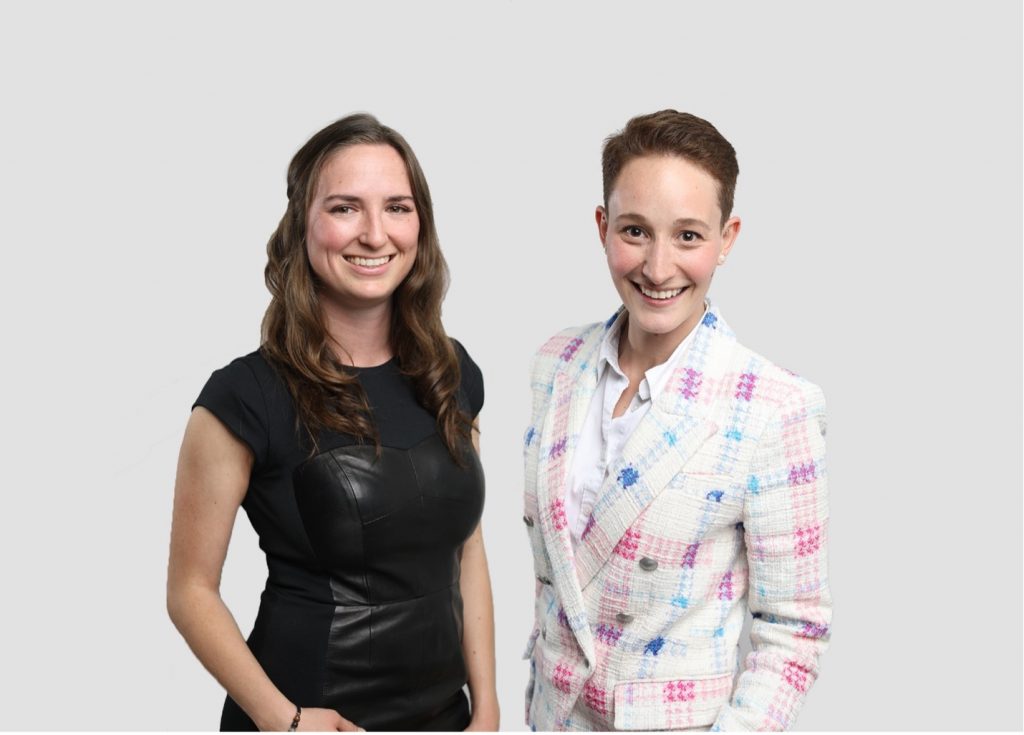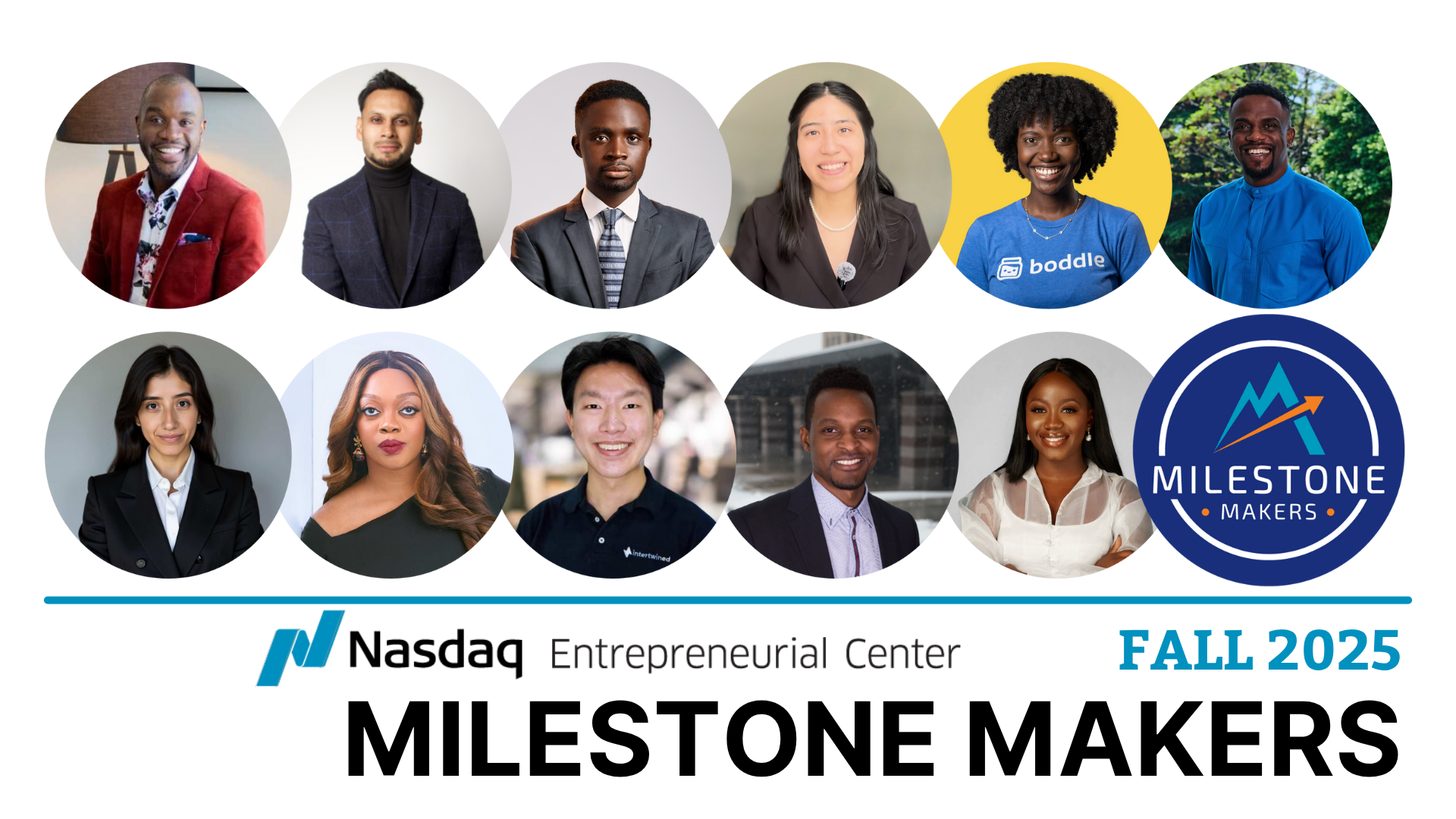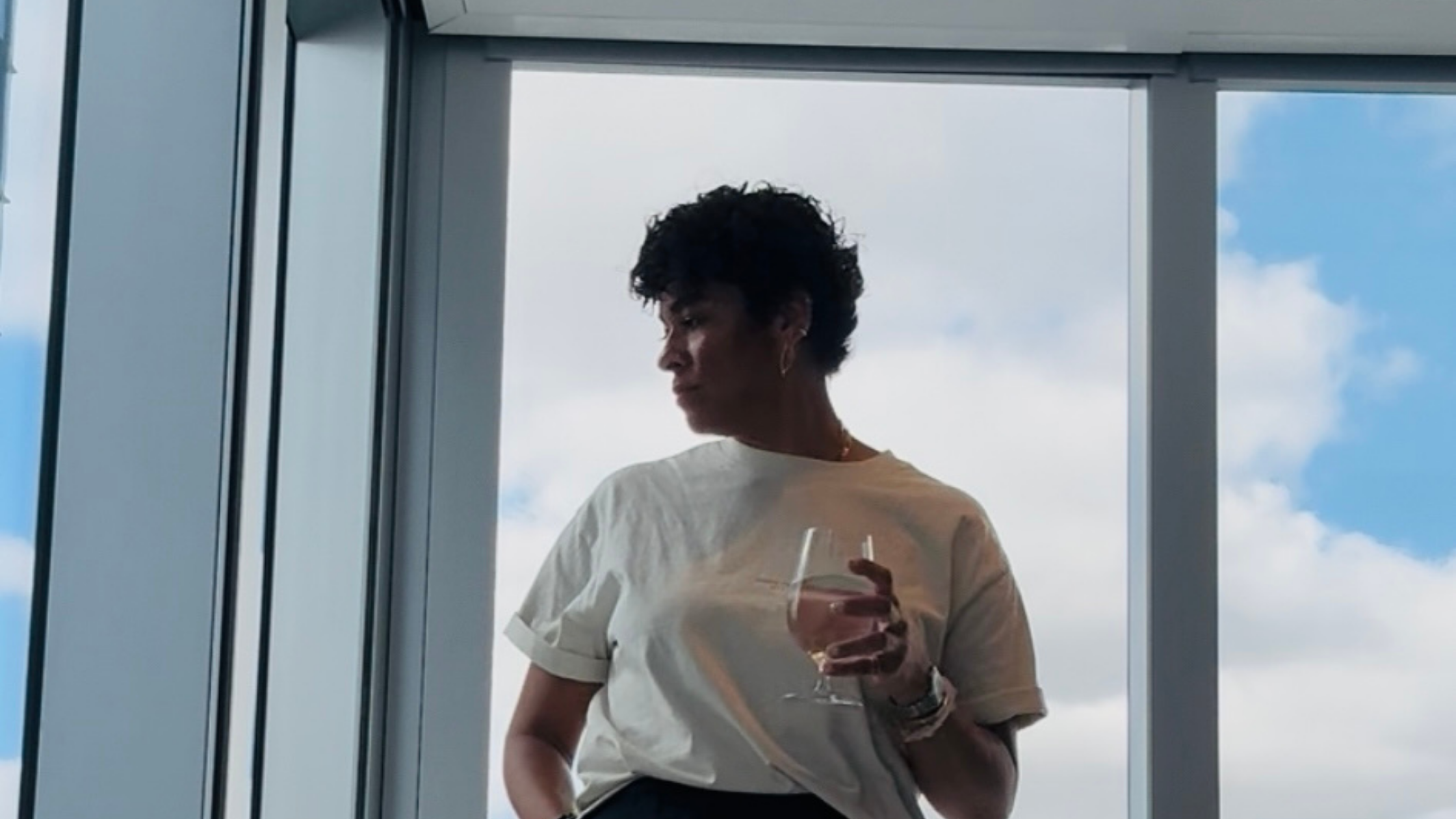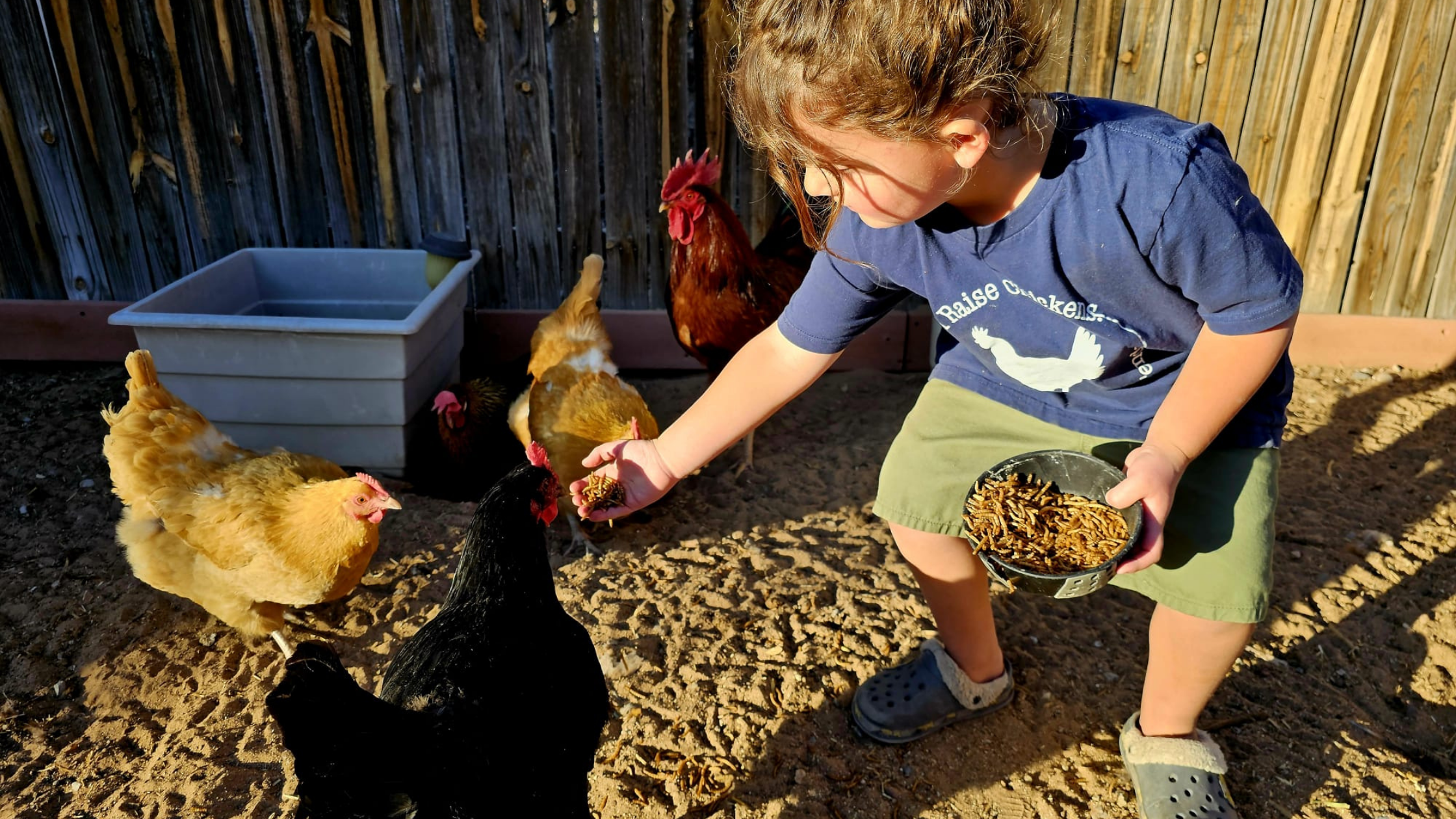Ilana Broad (they/she) is the Co-founder and General Counsel of The SHE Mark – offering the most inclusive set of gender equity certifications in the world. In the course of their personal gender journey and their professional career working for others and themselves, Ilana observed first-hand the disparate opportunities and recognition afforded femmes. They were honored to be approached by Sterling to assist in building and launching this movement to recognize and celebrate women and gender-diverse people in business. Ilana brings to The SHE Mark skills and experience in transactional intellectual property law, which they developed through their legal education and ensuing career, as well as entrepreneurial experience, which they gained by launching their own law practice. Ilana has been awarded the SuperLawyers Rising Star recognition for their lawyering expertise in each of the four years in which they were eligible (2018, 2019, 2020, & 2021). Ilana is also a foster animal parent, a permanent parent to Hazel the cat and Cheesecake the dog, and a mediocre crocheter.
What does “entrepreneurship” mean to you?
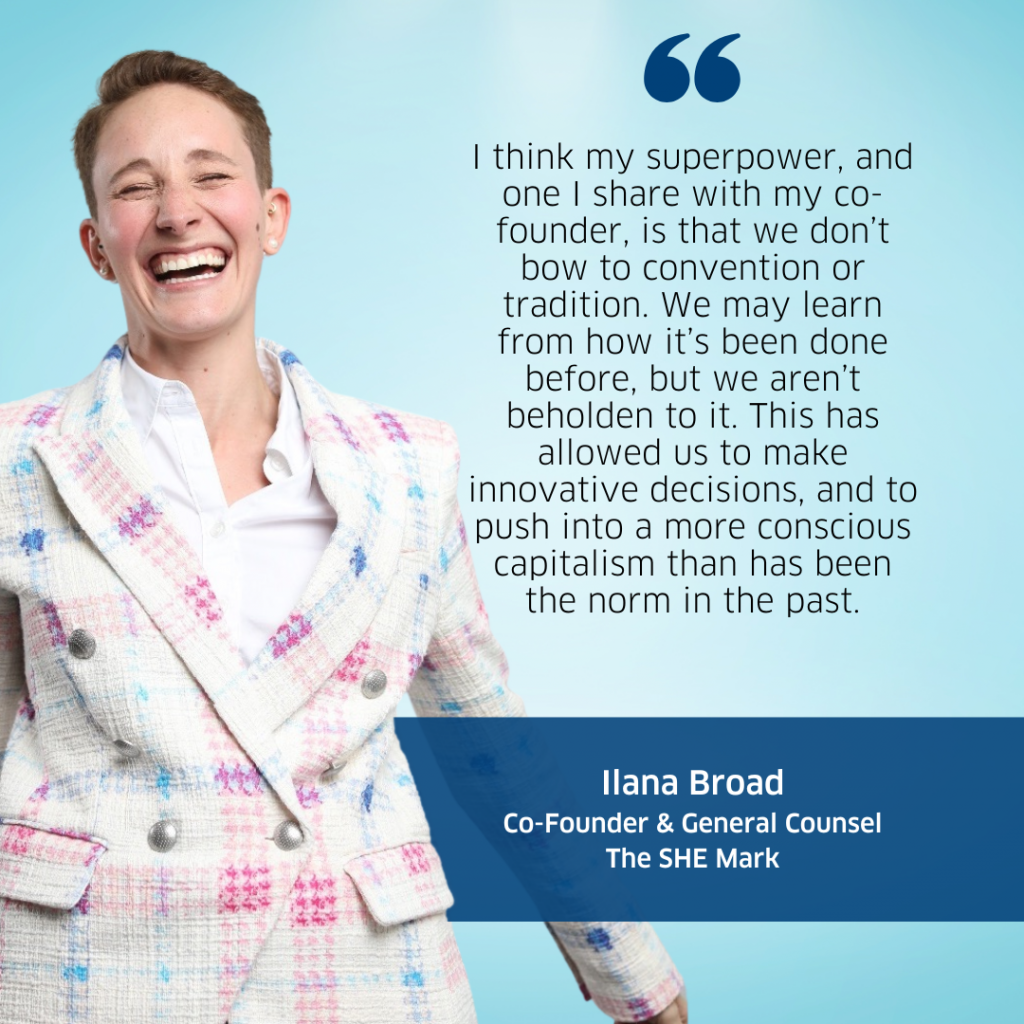 Ilana Broad: Entrepreneurship is, at its core, about being your own boss. For me, the goal has never been simply not to answer to someone else, but really about building enough of a business that I can support a community of stakeholders and answer to them. Being an entrepreneur is a huge responsibility, and if you’re lucky that responsibility extends to stakeholders beyond you and your immediate community, to include clients, employees, and more.
Ilana Broad: Entrepreneurship is, at its core, about being your own boss. For me, the goal has never been simply not to answer to someone else, but really about building enough of a business that I can support a community of stakeholders and answer to them. Being an entrepreneur is a huge responsibility, and if you’re lucky that responsibility extends to stakeholders beyond you and your immediate community, to include clients, employees, and more.
Tell us about your first experience with entrepreneurship.
IB: My first experience with entrepreneurship was a bit unconventional. I’d been working in-house in the legal department at a large record and publishing company and offering legal services on the side to musical artists that I believed in. My work availability for my direct clients was limited given my full-time job, and I often turned down work due to time limitations. As my time in-house came to an end, I reached out to all the creators that I had previously turned away and offered rates better than their alternative options. My client list grew before I was even able to formalize my solo practitioner website. Once I was more formally up and running, things kind of took off.
What is your company’s origin story? What is the biggest reason you started your business? What did those early days look like and teach you?
IB: The SHE Mark was born when my co-founder, Sterling Champion, felt she had a need that wasn’t being met in the market. After extensive research, she struggled to be able to find brands that are led by women. She knew there had to be an easier way to make values-based purchases with a gender-lens. When she approached me with the idea to share easy-to-understand information about the gender equity behind a company, I just wanted to support her in her mission. Those really early days were about brainstorming and figuring out the contours of the business idea and the legal structure behind it.
I guess what I brought to those brain storming sessions was useful, because Sterling chose to bring me on as co-founder, for which I will be forever grateful. Thereafter, we broke into more of the specifics of the idea – corporate formation, legal structure and binding contracts, the contours of the intellectual property we wanted to license, and eventually branding and operations. What was most exciting to me at this early stage – and something I’m extremely proud of – was that we were considering stakeholder impact at every crossroads. Every formative decision we made was considerate of people and planet alongside profit. We maintain that value set, today.
When we started this business, the biggest reason we wanted to launch was to inform consumers. As we’ve grown, I think my biggest reason for doing this work has shifted more towards the people engaging in the work; although getting consumers information about various companies is still very important to me and core to the company, now I think more frequently about the women employed and promoted by companies, and creative an economic incentive to push more companies to hire and promote with gender equity. The goal really is to change the world for the better and to benefit people of all genders by lifting up those that have historically been excluded from the economy or paid and promoted less than men.
What do you wish you knew when you started? is there anything you would do differently?
IB: I don’t think there’s any one thing I wish I knew when we started – we’ve worked really hard to be malleable as a business and as entrepreneurs, and we’ve prioritized learning every step of the way. There’s so much I know now that I didn’t know a few years ago, and I’m excited about the opportunity to continue learning more! It’s not about reflecting on our past and wishing I had done something differently, so much as being grateful that the choices I’ve made led to learning more, whether that’s by virtue of making a mistake or simply being exposed to a new concept or practice. I know that that’s what being an entrepreneur requires, and it’s one of my favorite parts of this work.
What does “success” look like for you? We’d love to hear your biggest, boldest dream? What do you think will help you achieve it?
IB: My biggest dream with The SHE Mark is to become obsolete but still impactful. When economic gender equity is so widespread that it doesn’t necessarily differentiate companies from their competitors, I will feel successful.
What is your superpower as an entrepreneur? What is your proudest and darkest moment so far? Share a key high and a key low from your journey if you can.
IB: I think my superpower, and one I share with my co-founder, is that we don’t bow to convention or tradition. We may learn from how it’s been done before, but we aren’t beholden to it. This has allowed us to make innovative decisions, and to push into a more conscious capitalism than has been the norm in the past.
What are your personal driving principals, your top values?
IB: Personally, I am driven by individualism and humanity – the idea that everyone should be able to express themselves and self-actualize as they individually desire is a major driving force in my personal life and my work life. This can get complicated and nuanced, especially in the business context, because it’s a lot easier to generalize stakeholders than it is to see their unique identity and humanity, but the latter builds empathy and I think that makes us all better people.
How have your personal principles and values shaped your company’s values and principles? Give us some examples.
IB: The SHE Mark has four core values: integrity, inclusivity, humanity, and sustainability. Obviously, there’s significant crossover between my personal values and our corporate values of inclusivity and humanity. For example, listening to Black women in particular and learning about their experiences as entrepreneurs, business owners, employers, and leaders has pushed us to develop our internal SHEi program, through which we work to counteract the systemic forces that result in Black women-owned businesses making less revenue and employing fewer people than their white counterparts.
I’ve also found that building empathy can translate to consideration of environmental and indirect stakeholders, which contributes to our sustainability. For example, when we work with contractors and consultants outside of our company, we ask questions of the employees and the leaders at these firms and we get a feel for how their work and production impacts their team and the surrounding community. If a company can’t tell us how their trash disposal processes impact their environment, or if they don’t have any policies regarding reuse and recycling, I’ve become more aware of how that impacts their immediate environment and the rest of the world. We’ve also built a database of consultants and contractors we work with regularly, and we plant trees in the surrounding area to celebrate milestones, personal or professional. Just expanding my personal values beyond my immediate surroundings has really baked sustainability into our work naturally.
What’s it like to work alone or with your partners?
IB: Working alone is great but difficult – you really have to motivate yourself and manage your to-do list effectively, which is something I’m working on. Sometimes I feel like I have an endless list of tasks and I need to prioritize them – what’s difficult about that as an entrepreneur is that I sometimes feel like everything is a priority!
What’s particularly great about working with Sterling, for me, is that she’s really good at prioritizing our needs and goals, and her brain operates quite differently from mine, in a way that is very complimentary. For example, I see operations outlines in lists and she sees them more visually – together, we really build each other up.
Do you have a mentor? Tell us about what makes them valuable to you and your business?
IB: I don’t have a mentor right now. In my last career as an entertainment attorney, I frequently relied on mentors to help me learn and network, and one thing I noticed as my career transitioned into the social impact space was that my entertainment mentors were all white men. And don’t get me wrong, I am endlessly grateful to those men for all they’ve done for me and all they continue to do, but I made an active choice in this industry to wait to establish a mentor/protégé relationship until I found someone whose perspectives maybe aren’t systemically highlighted on their own. I want to continue to work to learn how other people live and experience the world, especially with regards to how they do business, so I’m still looking for a specific mentor in this space. I have gotten some really amazing and invaluable support and education through the mentorship program at StartOut, a queer-focused incubator and collective, including PR support from Michael Volpatt, and I’m very grateful to be included in the StartOut community.
What role does mentorship play in your world (as a mentor or mentee)?
IB: I am always on the lookout for a potential mentor and I hope to be able to learn more closely from someone in that regard soon, but in this moment mentorship doesn’t play as large of a role in my life and work so much as outreach and more general networking and learning.
Have you raised outside capital so far?
IB: No – we are entirely self-funded right now. We are considering a small friends and family round, but in the short term we are prioritizing sales and grants to fund the company.
Where do you meet investors?
IB: I rely on intentional communities targeting closing the VC-fundraising gap (wherein women- and female-led companies raise significantly less then man- and male-led companies), and my personal network to meet potential investors.
If you’ve chosen not to fundraise, why?
IB: So far, we’ve preferred to avoid raising outside capital in order to maintain control of the business. At The SHE Mark, we do not believe that ‘because that’s how it’s been done forever’ is a good reason to do anything, and we don’t want to be beholden to the old way of running a business.
We considered dilutive funding for several months (and may again in the near future) but opted to go the non-dilutive route for as long as we can.
Many entrepreneurs continue to perfect their daily routines to support their work and greater vision; would you mind sharing your morning routine or a regular ritual that grounds your work each day?
IB: A few months ago, my answer would be totally different, but I recently took in a litter of puppies as fosters! With the pups, my morning routine starts with feeding all the pets, cleaning up after them, taking the mother for her morning walk, doing my morning self-care like brushing my teeth and washing my face, and then sitting down with some coffee to read a bit before work. I’ve always liked to start my day with coffee and a good read, because it gets my brain working. I used to do this before exams, too, even if they were very early in the morning, so the exam wasn’t the first thing I read all day. I hold this same policy for emails and other work – work should not be the first thing I read in the morning.
Thereafter, I either start work by jumping into emails, or I scribble down all of my thoughts on what I want to get done for the day, and then go back over the list to cut it down and reorganize it in terms of priority – I end up with multiple lists, but it helps me feel like my goals for the day are more realistic and achievable.
What are you reading or have read?
IB: I am currently working my way through the Revisioning American History series – right now I’m reading An Indigenous Peoples’ History of the United States, which you can find on our company Bookshop: https://bookshop.org/shop/theSHEmark.
Where do you go for inspiration?
IB: This is a great question – I try to sign up for as many newsletters as I can process and learn from by other organizations working in the for-profit social impact space. For example, I read every B Corp newsletter and I regularly attend their events. They had one recently on operating a conscious capitalist firm in the post-Roe United States, and that was a little forward-looking with regards to The SHE Mark specifically, but it’s inspiring to meet and learn from business leaders that are so deeply considering the impact of public policy on their employees and other stakeholders.
I also just try to have regular conversations with friends and network connections about impact operations and other ethical business practices. I’ve found that surrounding myself with relationships of intention – i.e. other people that value things similar to me and this company – is a great way to stay on top of new ideas and innovations in the space of stakeholder consideration.
Do you have a favorite quote, mantra, or words of wisdom to get through the tough days?
IB: I struggle with anxiety, so I often find myself reminding myself to breathe. I also regularly tell myself “gam ze ya’avor,” which is Hebrew for “this too shall pass.”
What is a problem that keeps you up at night?
IB: The circularity of intellectual property value keeps me up at night. By that I mean that the value of IP increases with public recognition of a certification mark, but public recognition increases with use of the mark and penetration of the market, which is easier to sell to companies and brands if there’s existing public recognition. It feels like we have to focus on all of those things at once, and also like they have to already exist to get the next one, which is difficult and a bit of a mind bender!
How do you think about helping others through your work?
IB: Uplifting women and gender-diverse people is the core purpose of my current work, so the question isn’t really how we think of helping others through the work, but how we can help the most people through our work. As we’ve operated The SHE Mark, I’m constantly learning about all of the ways that economic gender equity benefits everyone. Women use more of their disposable income to support their local communities, they circulate their money more and make more purchasing decisions, to say nothing of the emotional and household labor that women more frequently carry!
What advice do you have for fellow (and aspiring) entrepreneurs building and leading teams?
IB: The first thing I tell aspiring entrepreneurs is to find a co-founder. While it’s possible to build a company on your own, it’s a lot easier if you have a second set of experiences, ideas, communication styles, priorities, and skills on your side. The next piece of advice I’d like to share is to make sure that the rest of your team also reflects diverse experiences, ideas, communication styles, priorities, and skills – if everyone on your team looks and thinks like you, you’re likely not representing the full spectrum of people in the world, which isn’t just bad for the world in general, but also likely limiting your company’s ability to understand the needs of and thus penetrate the market.
What kind of an entrepreneur do you want to be known as – as in, what do you want your legacy to be?
IB: I want to be known as an impact trailblazer. I want to be considerate and inclusive of different people all around the world, and show other entrepreneurs and business leaders that this type of thinking and decision making is good for everyone, including themselves and especially their company. I want to consider stakeholder impact effectively, and build a successful company, and model that kind of entrepreneurship and leadership to others.
Do you have someone you’d like to nominate to be profiled in our Faces of Entrepreneurship series? Please let us know by emailing media@thecenter.nasdaq.org or submit your nomination using this form.

